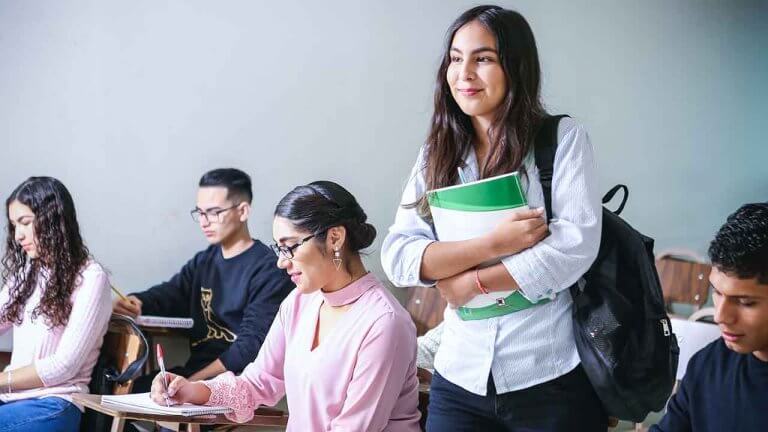Source of Image : Unsplash – https://unsplash.com/photos/iQPr1XkF5F0
By Muhammad ‘Aamil Azhar, Research Analyst, Institut Masa Depan Malaysia
As a teenager I’d look for any reasons to not go to school, whether it be stomach ache, toothache, or backache – I’d be a headache to my doting mother whenever weekdays rolled by. Holiday would come as a respite after many tiring days at school where we’d have to march from class to field to the hall.
Despite being the lazy student I am, missing out on a single day of classes would make me feel uneasy. Guilt gets the best of you for missing out on any announcements or homeworks, as well as being out of the loop on the latest stories from our friends.
Self-studying was never my forte, for the days when I missed out on school, and had to revise on my own, the days felt longer than usual. Keep in mind that it was only for a few days out of a year. With the study-at-home order in place since last March, imagine the hardships our students are going through. Homes could never replace schools, and they were never built to do so.
I believe the Ministry of Education’s (MOE) decision to open up schools, looked at in a vacuum, is ultimately the correct one. Countless journalists have reported on the lamentation of students studying from home. These problems range from a lack of e-learning gadgets, gaps in rural infrastructure, high costs of data as well as human factors such as boredom and exhaustion. The crux of this issue is not studying from home or homeschooling per se, but the unpreparedness in facing this issue.
Whilst there are some benefits from studying from home, the effect on our future generations will be far reaching and long lasting.
School drop-out rates will increase post COVID-19, even higher than the official 0.01% increase from 2019 to 2020 as reported by MOE. This is supported by studies of urban poor families in Klang Valley done by United Nation agencies where they found that children have lost interest in schooling ever since the lockdown began last March and a significant number has not returned to school when it reopened.
COVID-19 has caused poor families to fall even deeper into the poverty trap. First, their parents are earning less, and secondly, they are not able to afford the cost associated with school attendance. Parents who pre-pandemic have already scraped by to pay transportation and pocket money now also have to tack on the cost of face masks. Not a small amount for those who have also shelled out money to purchase mobile data for their children’s education during the lockdown.
As can be seen even before the pandemic, children from poorer families tend to leave schools in order to gain financial freedom and to support their parents and siblings. The increased poverty levels due to COVID-19 will indefinitely push even more adolescents to start working in the grey economy. The grey/informal economy will provide only measly income with very limited career development in the future.
Besides the cost and income factor, students are also less likely to return to school due to their inability to catch up to their studies. Remote learning is less effective at delivering structured syllabus as what schools are made to provide. Students can’t as easily approach their teachers for a hands-on guide and it’s similarly as difficult to discuss with their friends through chat or video. This contributes to them feeling left behind. Girls are more likely to suffer from the transition to a purely online learning experience due to their lower proficiency with electronic devices. For many families, the use of computers and the internet and thus mastery of ICT skills have been taken up by more girls than boys.
School closures of 2020 have led to losses in learning that would not be easily made up even if it were to be open in the blink of an eye. Online schooling might work for some, but for most students, a hands-on approach is a necessity in their learning experience. A salient example can be found with STEM students which require a greater degree of visualisation and practical work, curricular which can be most effectively provided with in-person schooling.
TVET programs which have a focus on practical skills find it particularly difficult to migrate to distance learning. Practical skills are developed through hands-on experience in workshops or workplace. Remote learning can never substitute the guided use of equipment and materials not usually available at home. Prolonged gap between TVET students and instructors would cause loss of skills, knowledge and confidence.
One might think that students with disabilities would benefit from online classes, but this view is severely misguided. Taking example from studies in the United Kingdom, disabled students were instead left without assistance of study support in the form of sign-language interpreters, note-takers, to name just a few. These students might be surrounded by well meaning families, however these families do not have the same abilities as professional educators nor do they have the infrastructure that facilitates specialized conducive learning.
A commonly talked about topic issue during COVID-19 is regarding mental health, but physical health of children would also stand to deteriorate as long as they are cooped up at home.
The sedentary lifestyle of stay-at-home students will worsen their health. Pennington Biomedical Research Centre released the result of their study that showed the lockdown was detrimental to everyone’s health. Whilst eating out was lessened significantly, instances of snacking increased, sedentary habits developed, physical activity was allotted less time.
The ill effects of school closures during the pandemic have and will most likely continue to rise. Looking only through the rise in the number of school drop-outs, one can already imagine the repercussions it would have on our youth. These children are victims of a dawdling education system as well as of systemic poverty in Malaysia.
